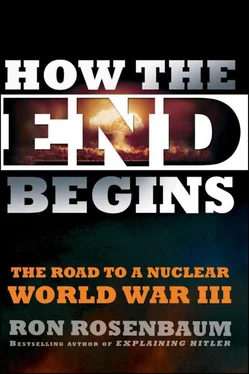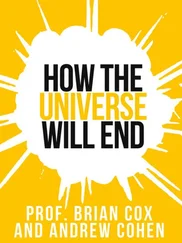The president, the commander-in-chief, is the ultimate “authorizer.” In the aftermath or imminence of nuclear attack his word means launch, his word is law, he has the Gold Codes in the nuclear football that identify him and only him as the ultimate authorizer of Armageddon. But what if his mind is deranged, disordered, even damagingly intoxicated? Should there be a breathalyzer lock on the nuclear football? A brain scan? Can he launch despite displaying symptoms of imbalance? Is there anything to stop him?
Major Hering’s question was troublesome because it made explicit a question that has occurred to others contemplating the Rube Goldbergian architecture of our nuclear command and control system. It challenged the comfortable assumption that if we launched a nuclear weapon, it would be, backed by a serious military rationale, not because anyone in charge might be possessed by a private demon. But few have spoken aloud about this deeply troubling issue or put their doubts into print. The question had its origin in the Cold War, but hasn’t gone away after it ended. To this day, there is no language about the president’s sanity, his state of mind, in the fail-safe protocols, just his identity. It is assumed that in giving such an order, he is serving the interests of the government and people he was elected to lead and protect. You might think such a question—the sanity of a president who gives a nuclear launch order—would require some extra scrutiny, but Major Hering’s inconvenient query put a spotlight on the fact that the most horrific decision in history could be executed in less than fifteen minutes by one person with no time for second-guessing.
And the major’s impertinent query didn’t end there. He also wanted to know, according to his lawyer, “what checks and balances exist to verify that an unlawful order does not get in to the missile men… and he was concerned with such things as Presidential imbalance or an unauthorized person infiltrating the system.” [58]An impostor command getting inside the system? The possibility, which may have seemed abstract thirty-five years ago, is now real: we know that hacker attacks, many believed to have originated from China’s military, have regularly targeted the Pentagon and our nuclear command and control system. Major Hering’s concern about an unlawful order getting “in to the missile men” is even more troubling when an infiltrator does not have to be a person, just a burst of digital code.
Major Hering was eloquent in defense of his question. “What are the checks and balances?” he wanted to know. “I have to say I feel I do have a need to know because I am a human being.” [59]Invoking his humanity—the words were so nakedly true. And he went further: “It is inherent in an officer’s commission that he has to do what is right in the terms of the needs of the nation despite any orders to the contrary. You really don’t know at the time of key turning, whether you are complying with your oath of office.” [60]
At the time of key turning. Holding the launch keys can have a transformative effect on human beings. They are the final link between the mind of the sane or insane president who gave the order and the missiles that will carry them out. They are the objective correlative of Armageddon. They make their holders lords of the nuclear Ring. Holding them leaves some scarred, few unchanged. And when he spoke of his officer’s commission and the potential conflict between “the needs of the nation” and “orders to the contrary,” he was, knowingly or unknowingly, invoking the Nuremberg trial precedent: just “following orders” isn’t a defense for complicity in genocide. An officer has a duty to resist an illegal, immoral order. What he was asserting was the military tradition that officers take their oaths to the Constitution, not the president.
“I have always stated that I would perform the duties required of a missile launch officer with or without this information,” Major Hering said, “but I would be unable to do so without a feeling of concern on my part as far as constitutional guidelines are concerned as I understand them.” [61]One is tempted to say that the “feeling of concern” would not mean much to the tens of millions dead as it would to the major, but one does not wish to diminish his honor and nerve in just raising the question. And then, at the heart of the sanity question, there’s the problem the major raised of “constitutional guidelines.” Could the president order a nuclear launch on his own without—or despite—consultation? Did he require more than his own will to destroy the world? Did he require evidence for his decision? If so, to whom did he have to show it? George W. Bush’s vice president had a clear answer to these questions. In late 2008, Dick Cheney made the following claim about a president’s ability to launch a strike: “The President of the United States now for 50 years is followed at all times, 24 hours a day, by a military aide carrying a football that contains the nuclear codes that he would use and be authorized to use in the event of a nuclear attack on the United States. He could launch a kind of devastating attack the world’s never seen. He doesn’t have to check with anybody. He doesn’t have to call the Congress. He doesn’t have to check with the courts. He has that authority because of the nature of the world we live in.” [62]In other words: nuclear weapons require instantaneous decisions, and in that fifteen-minute hair-trigger posture we retain from the Cold War, the president doesn’t have to consult anybody. For Cheney, going nuclear means never having to say you’re sorry. (Unless, as with Bill Clinton, you lose the codes for months as was revealed in October 2010 by former Joint Chiefs General Hugh Shelton.)
This set off a frenzy among constitutional scholars, who could not reach a consensus about whether Cheney was right, in part because of the ambiguity of the Constitution on the president’s role. [63]He is at once commander-in-chief who may be called upon to make immediate decisions about military responses to protect the nation, and as such his power is unlimited. On the other hand, the Constitution requires that he ask Congress for a declaration of war and Congress can defund any military activity he is engaged in. Looked at that way, he does have to check with others. But when there’s no time? When delay or inaction is in effect action, self-destructive action perhaps? It’s too late to defund a nuke once it’s launched on orders of the commander-in-chief.
Defenders of Cheney argued the Supreme Court was on his side. [64]In 1862, they said, it had affirmed Lincoln’s unitary executive capacity to order military action against privateers that were trying to break the blockade of the Confederacy, without a declaration of war, since, as with terrorists today, there was no known return address or name to send the declaration to. It was also pointed out that those defending Pearl Harbor on December 7, 1941, the antiaircraft gunners firing back at the attacking aircraft, were taking military action before a declaration of war. They were acting, in effect, as agents of the executive branch. But ordering a nuclear strike, which requires record speed and carries civilization-ending consequences, does not fit neatly into those precedents.
So the question comes back to Major Hering’s: If the president doesn’t have to check with anybody, can he be trusted to do the right thing? If not, what system is in place to stop him? Back when he raised the issue, there was special reason for concern because the guy with the nuclear keys at his command, Richard Nixon, seemed to be losing control over his own mind as the Watergate scandal began engulfing his presidency. The concern was so acute that one cabinet member, Defense Secretary James Schlesinger, had in fact set up a secret system to monitor any orders that would result in turning those keys. According to newspaper reports at the time, Schlesinger had issued hush-hush orders to those below him in the nuclear chain of command that anyone receiving “unusual orders” from President Nixon was to immediately report back to him, Schlesinger. According to one report, Nixon had told a group of Congressmen during the time of his impeachment hearings that “I could leave this room and in 25 minutes 70 million people would be dead.” [65]Schlesinger never denied the story about his nuclear precautions, which was scary on two levels: first that the fate of the world was in the hands of an unstable president, and second that the secretary of defense was nervous enough about the situation to take proactive measures to guard against the possibility of him nuking another country in a fit of rage. Think about that: 70 million dead in 25 minutes. It helps to cut through the numbness to have a number, even if it is the number inside the unbalanced mind of a president.
Читать дальше











